Environmental History: The Role of Fossil Fuels in Society's Evolution
VerifiedAdded on 2022/08/13
|10
|2140
|13
Essay
AI Summary
This essay delves into the environmental history of fossil fuels, examining their profound and often controversial impact on society and the planet. It explores the historical context of energy consumption, tracing the evolution from the invention of fire to the industrial revolution and beyond. Th...
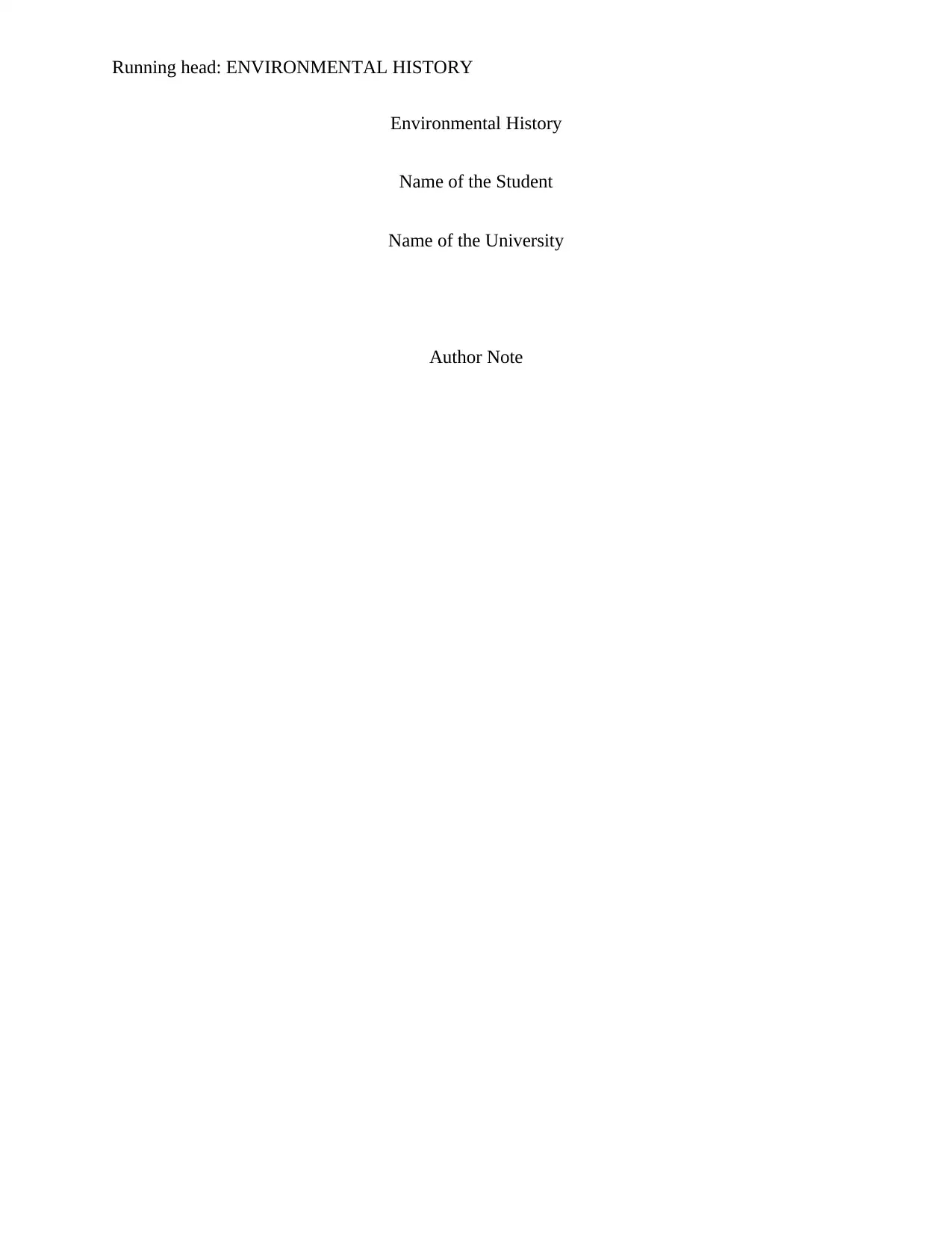
Running head: ENVIRONMENTAL HISTORY
Environmental History
Name of the Student
Name of the University
Author Note
Environmental History
Name of the Student
Name of the University
Author Note
Paraphrase This Document
Need a fresh take? Get an instant paraphrase of this document with our AI Paraphraser
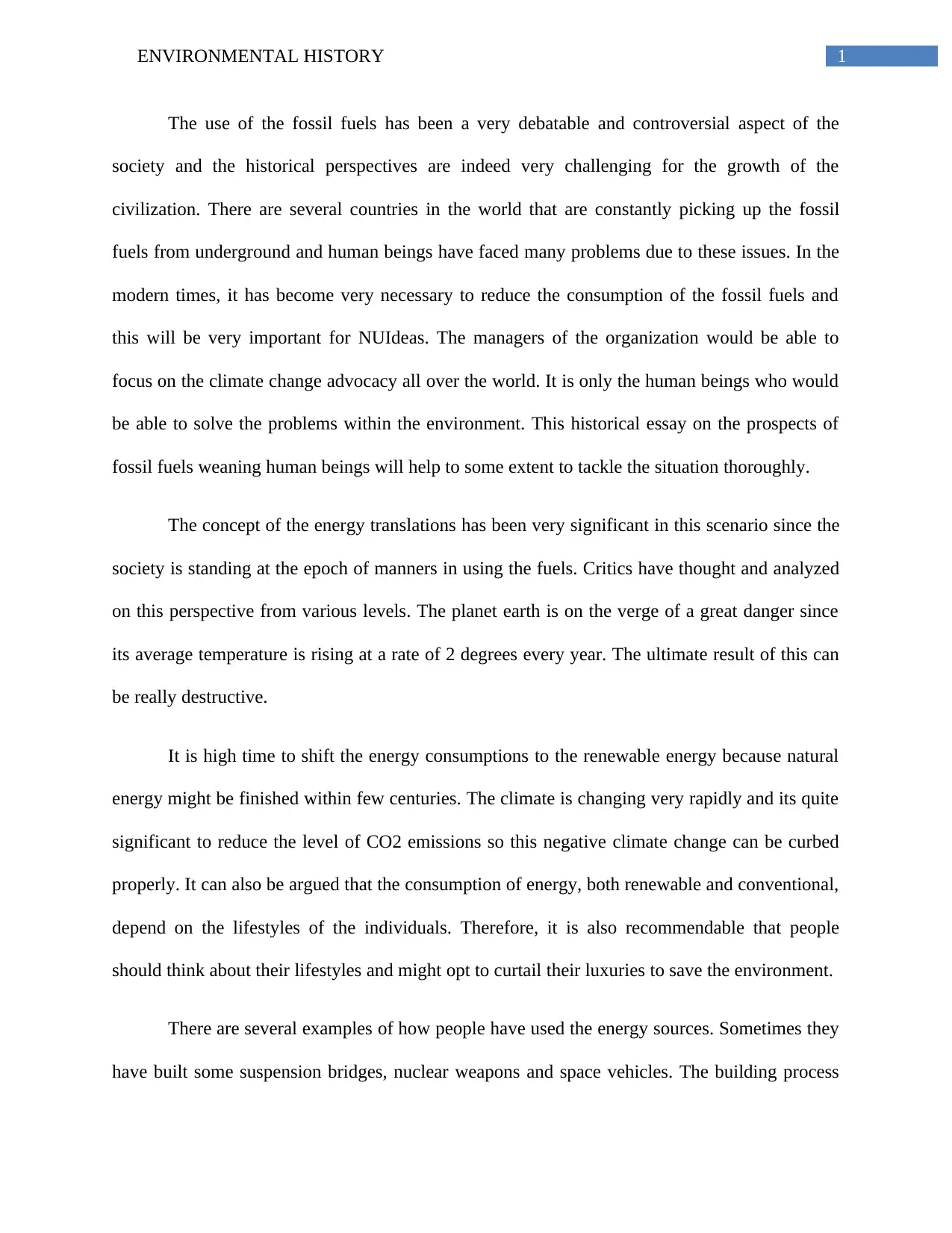
1ENVIRONMENTAL HISTORY
The use of the fossil fuels has been a very debatable and controversial aspect of the
society and the historical perspectives are indeed very challenging for the growth of the
civilization. There are several countries in the world that are constantly picking up the fossil
fuels from underground and human beings have faced many problems due to these issues. In the
modern times, it has become very necessary to reduce the consumption of the fossil fuels and
this will be very important for NUIdeas. The managers of the organization would be able to
focus on the climate change advocacy all over the world. It is only the human beings who would
be able to solve the problems within the environment. This historical essay on the prospects of
fossil fuels weaning human beings will help to some extent to tackle the situation thoroughly.
The concept of the energy translations has been very significant in this scenario since the
society is standing at the epoch of manners in using the fuels. Critics have thought and analyzed
on this perspective from various levels. The planet earth is on the verge of a great danger since
its average temperature is rising at a rate of 2 degrees every year. The ultimate result of this can
be really destructive.
It is high time to shift the energy consumptions to the renewable energy because natural
energy might be finished within few centuries. The climate is changing very rapidly and its quite
significant to reduce the level of CO2 emissions so this negative climate change can be curbed
properly. It can also be argued that the consumption of energy, both renewable and conventional,
depend on the lifestyles of the individuals. Therefore, it is also recommendable that people
should think about their lifestyles and might opt to curtail their luxuries to save the environment.
There are several examples of how people have used the energy sources. Sometimes they
have built some suspension bridges, nuclear weapons and space vehicles. The building process
The use of the fossil fuels has been a very debatable and controversial aspect of the
society and the historical perspectives are indeed very challenging for the growth of the
civilization. There are several countries in the world that are constantly picking up the fossil
fuels from underground and human beings have faced many problems due to these issues. In the
modern times, it has become very necessary to reduce the consumption of the fossil fuels and
this will be very important for NUIdeas. The managers of the organization would be able to
focus on the climate change advocacy all over the world. It is only the human beings who would
be able to solve the problems within the environment. This historical essay on the prospects of
fossil fuels weaning human beings will help to some extent to tackle the situation thoroughly.
The concept of the energy translations has been very significant in this scenario since the
society is standing at the epoch of manners in using the fuels. Critics have thought and analyzed
on this perspective from various levels. The planet earth is on the verge of a great danger since
its average temperature is rising at a rate of 2 degrees every year. The ultimate result of this can
be really destructive.
It is high time to shift the energy consumptions to the renewable energy because natural
energy might be finished within few centuries. The climate is changing very rapidly and its quite
significant to reduce the level of CO2 emissions so this negative climate change can be curbed
properly. It can also be argued that the consumption of energy, both renewable and conventional,
depend on the lifestyles of the individuals. Therefore, it is also recommendable that people
should think about their lifestyles and might opt to curtail their luxuries to save the environment.
There are several examples of how people have used the energy sources. Sometimes they
have built some suspension bridges, nuclear weapons and space vehicles. The building process
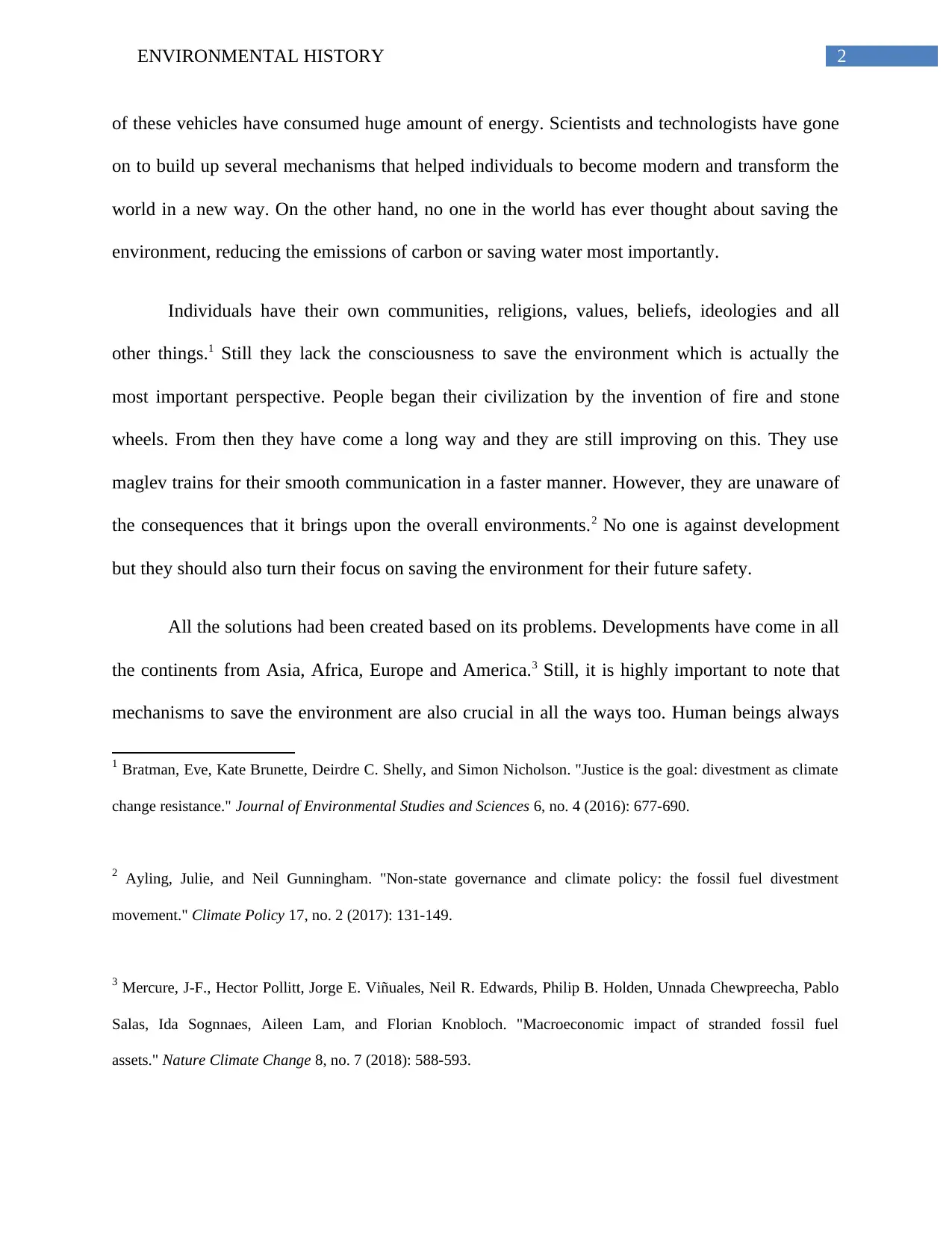
2ENVIRONMENTAL HISTORY
of these vehicles have consumed huge amount of energy. Scientists and technologists have gone
on to build up several mechanisms that helped individuals to become modern and transform the
world in a new way. On the other hand, no one in the world has ever thought about saving the
environment, reducing the emissions of carbon or saving water most importantly.
Individuals have their own communities, religions, values, beliefs, ideologies and all
other things.1 Still they lack the consciousness to save the environment which is actually the
most important perspective. People began their civilization by the invention of fire and stone
wheels. From then they have come a long way and they are still improving on this. They use
maglev trains for their smooth communication in a faster manner. However, they are unaware of
the consequences that it brings upon the overall environments.2 No one is against development
but they should also turn their focus on saving the environment for their future safety.
All the solutions had been created based on its problems. Developments have come in all
the continents from Asia, Africa, Europe and America.3 Still, it is highly important to note that
mechanisms to save the environment are also crucial in all the ways too. Human beings always
1 Bratman, Eve, Kate Brunette, Deirdre C. Shelly, and Simon Nicholson. "Justice is the goal: divestment as climate
change resistance." Journal of Environmental Studies and Sciences 6, no. 4 (2016): 677-690.
2 Ayling, Julie, and Neil Gunningham. "Non-state governance and climate policy: the fossil fuel divestment
movement." Climate Policy 17, no. 2 (2017): 131-149.
3 Mercure, J-F., Hector Pollitt, Jorge E. Viñuales, Neil R. Edwards, Philip B. Holden, Unnada Chewpreecha, Pablo
Salas, Ida Sognnaes, Aileen Lam, and Florian Knobloch. "Macroeconomic impact of stranded fossil fuel
assets." Nature Climate Change 8, no. 7 (2018): 588-593.
of these vehicles have consumed huge amount of energy. Scientists and technologists have gone
on to build up several mechanisms that helped individuals to become modern and transform the
world in a new way. On the other hand, no one in the world has ever thought about saving the
environment, reducing the emissions of carbon or saving water most importantly.
Individuals have their own communities, religions, values, beliefs, ideologies and all
other things.1 Still they lack the consciousness to save the environment which is actually the
most important perspective. People began their civilization by the invention of fire and stone
wheels. From then they have come a long way and they are still improving on this. They use
maglev trains for their smooth communication in a faster manner. However, they are unaware of
the consequences that it brings upon the overall environments.2 No one is against development
but they should also turn their focus on saving the environment for their future safety.
All the solutions had been created based on its problems. Developments have come in all
the continents from Asia, Africa, Europe and America.3 Still, it is highly important to note that
mechanisms to save the environment are also crucial in all the ways too. Human beings always
1 Bratman, Eve, Kate Brunette, Deirdre C. Shelly, and Simon Nicholson. "Justice is the goal: divestment as climate
change resistance." Journal of Environmental Studies and Sciences 6, no. 4 (2016): 677-690.
2 Ayling, Julie, and Neil Gunningham. "Non-state governance and climate policy: the fossil fuel divestment
movement." Climate Policy 17, no. 2 (2017): 131-149.
3 Mercure, J-F., Hector Pollitt, Jorge E. Viñuales, Neil R. Edwards, Philip B. Holden, Unnada Chewpreecha, Pablo
Salas, Ida Sognnaes, Aileen Lam, and Florian Knobloch. "Macroeconomic impact of stranded fossil fuel
assets." Nature Climate Change 8, no. 7 (2018): 588-593.
⊘ This is a preview!⊘
Do you want full access?
Subscribe today to unlock all pages.

Trusted by 1+ million students worldwide
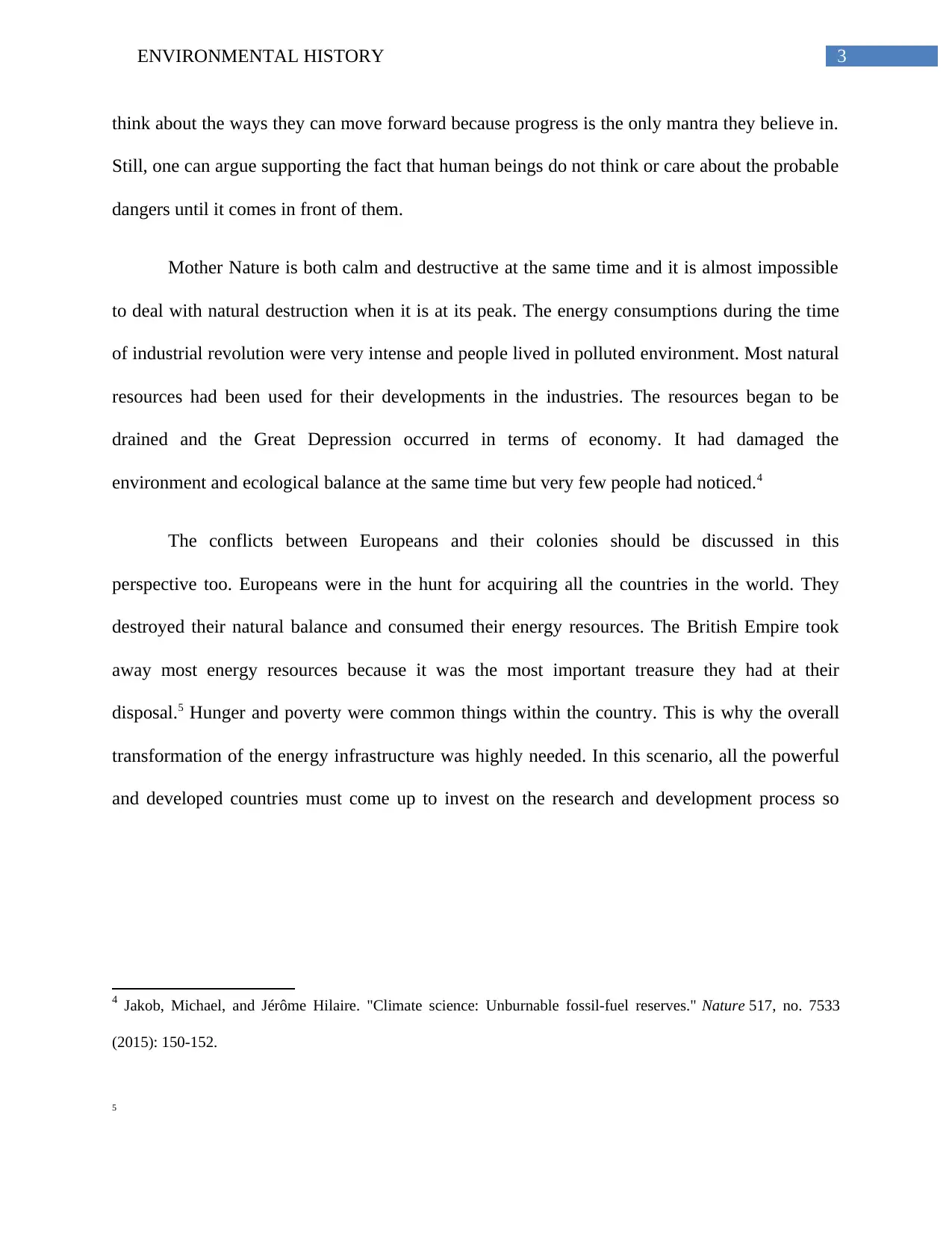
3ENVIRONMENTAL HISTORY
think about the ways they can move forward because progress is the only mantra they believe in.
Still, one can argue supporting the fact that human beings do not think or care about the probable
dangers until it comes in front of them.
Mother Nature is both calm and destructive at the same time and it is almost impossible
to deal with natural destruction when it is at its peak. The energy consumptions during the time
of industrial revolution were very intense and people lived in polluted environment. Most natural
resources had been used for their developments in the industries. The resources began to be
drained and the Great Depression occurred in terms of economy. It had damaged the
environment and ecological balance at the same time but very few people had noticed.4
The conflicts between Europeans and their colonies should be discussed in this
perspective too. Europeans were in the hunt for acquiring all the countries in the world. They
destroyed their natural balance and consumed their energy resources. The British Empire took
away most energy resources because it was the most important treasure they had at their
disposal.5 Hunger and poverty were common things within the country. This is why the overall
transformation of the energy infrastructure was highly needed. In this scenario, all the powerful
and developed countries must come up to invest on the research and development process so
4 Jakob, Michael, and Jérôme Hilaire. "Climate science: Unburnable fossil-fuel reserves." Nature 517, no. 7533
(2015): 150-152.
5
think about the ways they can move forward because progress is the only mantra they believe in.
Still, one can argue supporting the fact that human beings do not think or care about the probable
dangers until it comes in front of them.
Mother Nature is both calm and destructive at the same time and it is almost impossible
to deal with natural destruction when it is at its peak. The energy consumptions during the time
of industrial revolution were very intense and people lived in polluted environment. Most natural
resources had been used for their developments in the industries. The resources began to be
drained and the Great Depression occurred in terms of economy. It had damaged the
environment and ecological balance at the same time but very few people had noticed.4
The conflicts between Europeans and their colonies should be discussed in this
perspective too. Europeans were in the hunt for acquiring all the countries in the world. They
destroyed their natural balance and consumed their energy resources. The British Empire took
away most energy resources because it was the most important treasure they had at their
disposal.5 Hunger and poverty were common things within the country. This is why the overall
transformation of the energy infrastructure was highly needed. In this scenario, all the powerful
and developed countries must come up to invest on the research and development process so
4 Jakob, Michael, and Jérôme Hilaire. "Climate science: Unburnable fossil-fuel reserves." Nature 517, no. 7533
(2015): 150-152.
5
Paraphrase This Document
Need a fresh take? Get an instant paraphrase of this document with our AI Paraphraser
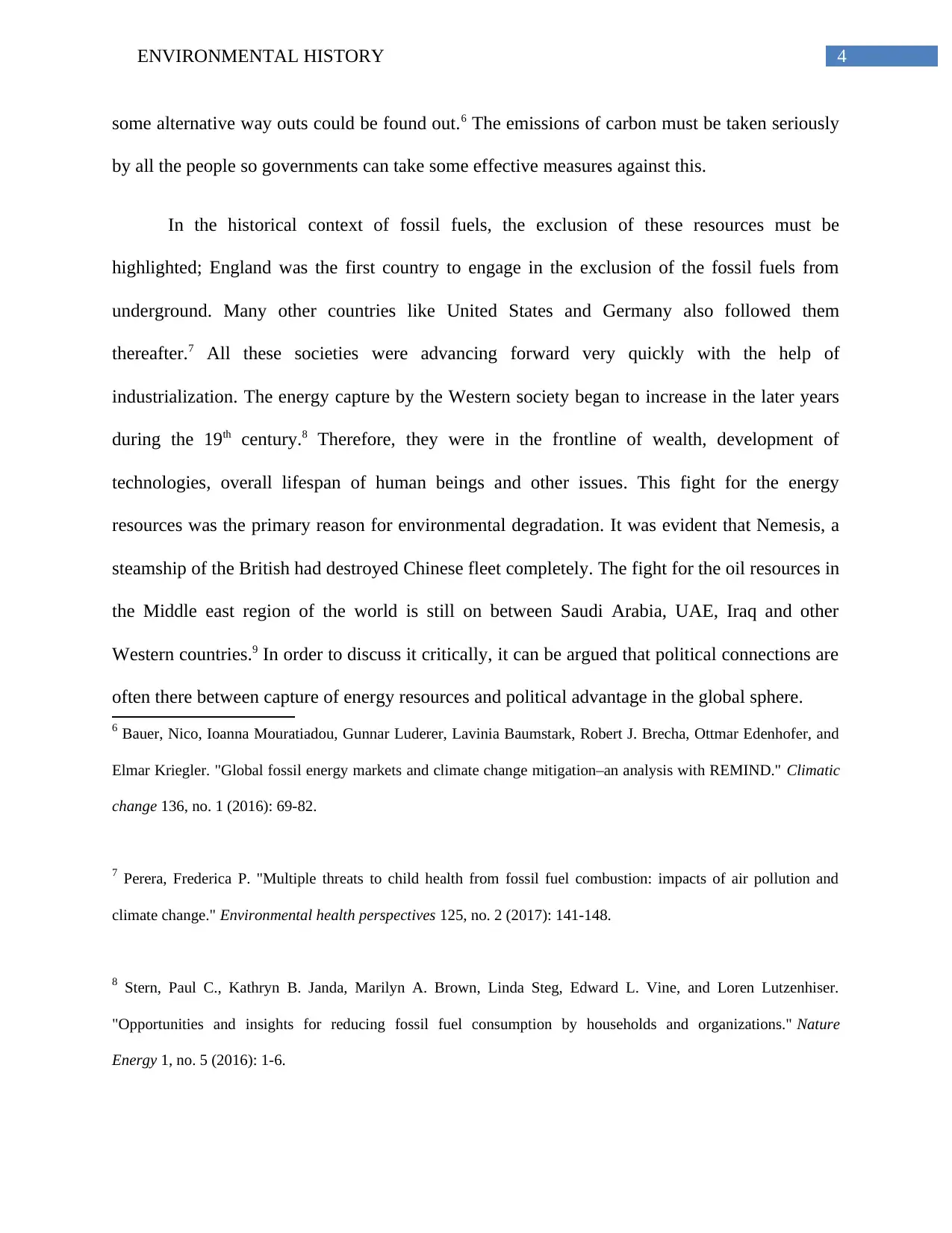
4ENVIRONMENTAL HISTORY
some alternative way outs could be found out.6 The emissions of carbon must be taken seriously
by all the people so governments can take some effective measures against this.
In the historical context of fossil fuels, the exclusion of these resources must be
highlighted; England was the first country to engage in the exclusion of the fossil fuels from
underground. Many other countries like United States and Germany also followed them
thereafter.7 All these societies were advancing forward very quickly with the help of
industrialization. The energy capture by the Western society began to increase in the later years
during the 19th century.8 Therefore, they were in the frontline of wealth, development of
technologies, overall lifespan of human beings and other issues. This fight for the energy
resources was the primary reason for environmental degradation. It was evident that Nemesis, a
steamship of the British had destroyed Chinese fleet completely. The fight for the oil resources in
the Middle east region of the world is still on between Saudi Arabia, UAE, Iraq and other
Western countries.9 In order to discuss it critically, it can be argued that political connections are
often there between capture of energy resources and political advantage in the global sphere.
6 Bauer, Nico, Ioanna Mouratiadou, Gunnar Luderer, Lavinia Baumstark, Robert J. Brecha, Ottmar Edenhofer, and
Elmar Kriegler. "Global fossil energy markets and climate change mitigation–an analysis with REMIND." Climatic
change 136, no. 1 (2016): 69-82.
7 Perera, Frederica P. "Multiple threats to child health from fossil fuel combustion: impacts of air pollution and
climate change." Environmental health perspectives 125, no. 2 (2017): 141-148.
8 Stern, Paul C., Kathryn B. Janda, Marilyn A. Brown, Linda Steg, Edward L. Vine, and Loren Lutzenhiser.
"Opportunities and insights for reducing fossil fuel consumption by households and organizations." Nature
Energy 1, no. 5 (2016): 1-6.
some alternative way outs could be found out.6 The emissions of carbon must be taken seriously
by all the people so governments can take some effective measures against this.
In the historical context of fossil fuels, the exclusion of these resources must be
highlighted; England was the first country to engage in the exclusion of the fossil fuels from
underground. Many other countries like United States and Germany also followed them
thereafter.7 All these societies were advancing forward very quickly with the help of
industrialization. The energy capture by the Western society began to increase in the later years
during the 19th century.8 Therefore, they were in the frontline of wealth, development of
technologies, overall lifespan of human beings and other issues. This fight for the energy
resources was the primary reason for environmental degradation. It was evident that Nemesis, a
steamship of the British had destroyed Chinese fleet completely. The fight for the oil resources in
the Middle east region of the world is still on between Saudi Arabia, UAE, Iraq and other
Western countries.9 In order to discuss it critically, it can be argued that political connections are
often there between capture of energy resources and political advantage in the global sphere.
6 Bauer, Nico, Ioanna Mouratiadou, Gunnar Luderer, Lavinia Baumstark, Robert J. Brecha, Ottmar Edenhofer, and
Elmar Kriegler. "Global fossil energy markets and climate change mitigation–an analysis with REMIND." Climatic
change 136, no. 1 (2016): 69-82.
7 Perera, Frederica P. "Multiple threats to child health from fossil fuel combustion: impacts of air pollution and
climate change." Environmental health perspectives 125, no. 2 (2017): 141-148.
8 Stern, Paul C., Kathryn B. Janda, Marilyn A. Brown, Linda Steg, Edward L. Vine, and Loren Lutzenhiser.
"Opportunities and insights for reducing fossil fuel consumption by households and organizations." Nature
Energy 1, no. 5 (2016): 1-6.
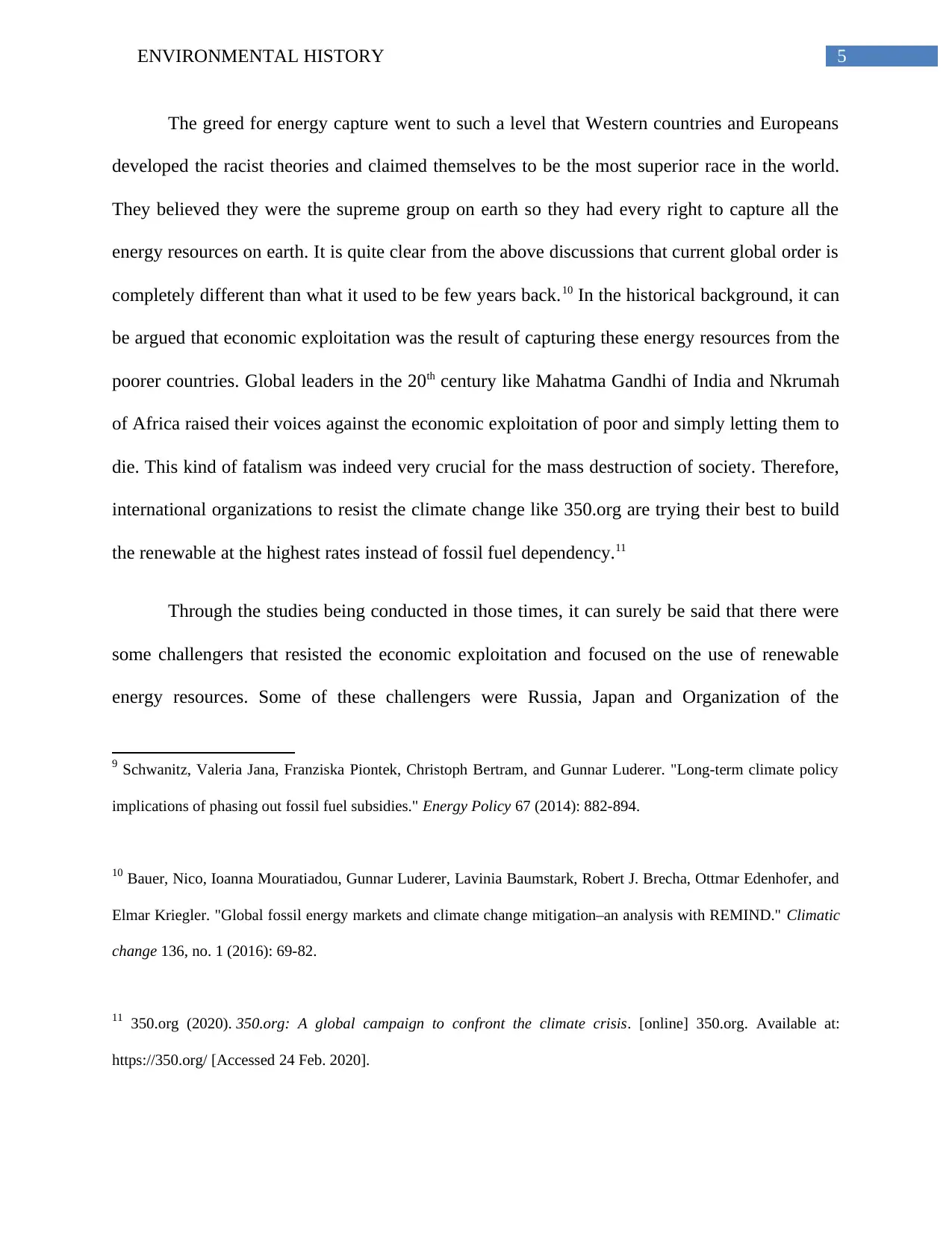
5ENVIRONMENTAL HISTORY
The greed for energy capture went to such a level that Western countries and Europeans
developed the racist theories and claimed themselves to be the most superior race in the world.
They believed they were the supreme group on earth so they had every right to capture all the
energy resources on earth. It is quite clear from the above discussions that current global order is
completely different than what it used to be few years back.10 In the historical background, it can
be argued that economic exploitation was the result of capturing these energy resources from the
poorer countries. Global leaders in the 20th century like Mahatma Gandhi of India and Nkrumah
of Africa raised their voices against the economic exploitation of poor and simply letting them to
die. This kind of fatalism was indeed very crucial for the mass destruction of society. Therefore,
international organizations to resist the climate change like 350.org are trying their best to build
the renewable at the highest rates instead of fossil fuel dependency.11
Through the studies being conducted in those times, it can surely be said that there were
some challengers that resisted the economic exploitation and focused on the use of renewable
energy resources. Some of these challengers were Russia, Japan and Organization of the
9 Schwanitz, Valeria Jana, Franziska Piontek, Christoph Bertram, and Gunnar Luderer. "Long-term climate policy
implications of phasing out fossil fuel subsidies." Energy Policy 67 (2014): 882-894.
10 Bauer, Nico, Ioanna Mouratiadou, Gunnar Luderer, Lavinia Baumstark, Robert J. Brecha, Ottmar Edenhofer, and
Elmar Kriegler. "Global fossil energy markets and climate change mitigation–an analysis with REMIND." Climatic
change 136, no. 1 (2016): 69-82.
11 350.org (2020). 350.org: A global campaign to confront the climate crisis. [online] 350.org. Available at:
https://350.org/ [Accessed 24 Feb. 2020].
The greed for energy capture went to such a level that Western countries and Europeans
developed the racist theories and claimed themselves to be the most superior race in the world.
They believed they were the supreme group on earth so they had every right to capture all the
energy resources on earth. It is quite clear from the above discussions that current global order is
completely different than what it used to be few years back.10 In the historical background, it can
be argued that economic exploitation was the result of capturing these energy resources from the
poorer countries. Global leaders in the 20th century like Mahatma Gandhi of India and Nkrumah
of Africa raised their voices against the economic exploitation of poor and simply letting them to
die. This kind of fatalism was indeed very crucial for the mass destruction of society. Therefore,
international organizations to resist the climate change like 350.org are trying their best to build
the renewable at the highest rates instead of fossil fuel dependency.11
Through the studies being conducted in those times, it can surely be said that there were
some challengers that resisted the economic exploitation and focused on the use of renewable
energy resources. Some of these challengers were Russia, Japan and Organization of the
9 Schwanitz, Valeria Jana, Franziska Piontek, Christoph Bertram, and Gunnar Luderer. "Long-term climate policy
implications of phasing out fossil fuel subsidies." Energy Policy 67 (2014): 882-894.
10 Bauer, Nico, Ioanna Mouratiadou, Gunnar Luderer, Lavinia Baumstark, Robert J. Brecha, Ottmar Edenhofer, and
Elmar Kriegler. "Global fossil energy markets and climate change mitigation–an analysis with REMIND." Climatic
change 136, no. 1 (2016): 69-82.
11 350.org (2020). 350.org: A global campaign to confront the climate crisis. [online] 350.org. Available at:
https://350.org/ [Accessed 24 Feb. 2020].
⊘ This is a preview!⊘
Do you want full access?
Subscribe today to unlock all pages.

Trusted by 1+ million students worldwide
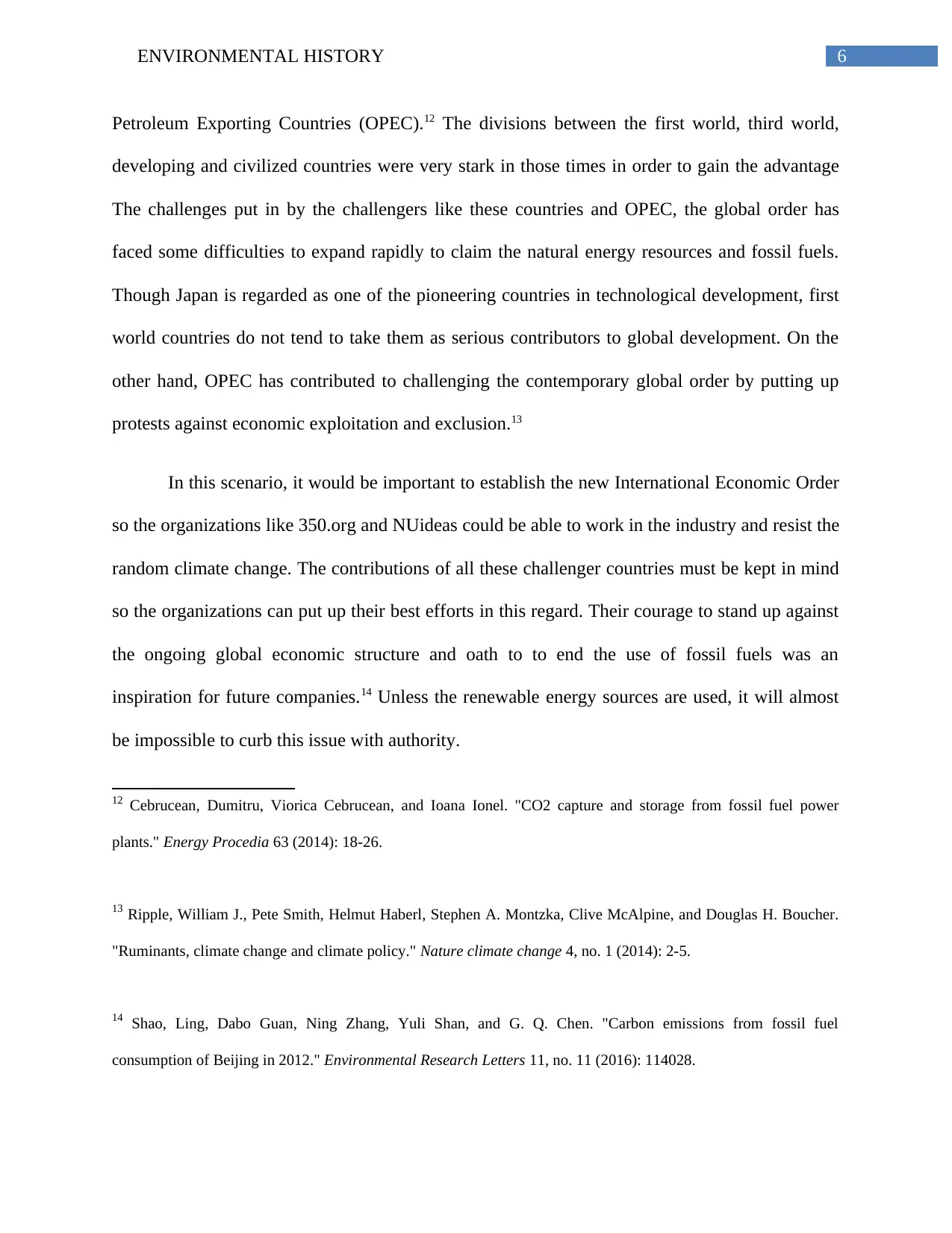
6ENVIRONMENTAL HISTORY
Petroleum Exporting Countries (OPEC).12 The divisions between the first world, third world,
developing and civilized countries were very stark in those times in order to gain the advantage
The challenges put in by the challengers like these countries and OPEC, the global order has
faced some difficulties to expand rapidly to claim the natural energy resources and fossil fuels.
Though Japan is regarded as one of the pioneering countries in technological development, first
world countries do not tend to take them as serious contributors to global development. On the
other hand, OPEC has contributed to challenging the contemporary global order by putting up
protests against economic exploitation and exclusion.13
In this scenario, it would be important to establish the new International Economic Order
so the organizations like 350.org and NUideas could be able to work in the industry and resist the
random climate change. The contributions of all these challenger countries must be kept in mind
so the organizations can put up their best efforts in this regard. Their courage to stand up against
the ongoing global economic structure and oath to to end the use of fossil fuels was an
inspiration for future companies.14 Unless the renewable energy sources are used, it will almost
be impossible to curb this issue with authority.
12 Cebrucean, Dumitru, Viorica Cebrucean, and Ioana Ionel. "CO2 capture and storage from fossil fuel power
plants." Energy Procedia 63 (2014): 18-26.
13 Ripple, William J., Pete Smith, Helmut Haberl, Stephen A. Montzka, Clive McAlpine, and Douglas H. Boucher.
"Ruminants, climate change and climate policy." Nature climate change 4, no. 1 (2014): 2-5.
14 Shao, Ling, Dabo Guan, Ning Zhang, Yuli Shan, and G. Q. Chen. "Carbon emissions from fossil fuel
consumption of Beijing in 2012." Environmental Research Letters 11, no. 11 (2016): 114028.
Petroleum Exporting Countries (OPEC).12 The divisions between the first world, third world,
developing and civilized countries were very stark in those times in order to gain the advantage
The challenges put in by the challengers like these countries and OPEC, the global order has
faced some difficulties to expand rapidly to claim the natural energy resources and fossil fuels.
Though Japan is regarded as one of the pioneering countries in technological development, first
world countries do not tend to take them as serious contributors to global development. On the
other hand, OPEC has contributed to challenging the contemporary global order by putting up
protests against economic exploitation and exclusion.13
In this scenario, it would be important to establish the new International Economic Order
so the organizations like 350.org and NUideas could be able to work in the industry and resist the
random climate change. The contributions of all these challenger countries must be kept in mind
so the organizations can put up their best efforts in this regard. Their courage to stand up against
the ongoing global economic structure and oath to to end the use of fossil fuels was an
inspiration for future companies.14 Unless the renewable energy sources are used, it will almost
be impossible to curb this issue with authority.
12 Cebrucean, Dumitru, Viorica Cebrucean, and Ioana Ionel. "CO2 capture and storage from fossil fuel power
plants." Energy Procedia 63 (2014): 18-26.
13 Ripple, William J., Pete Smith, Helmut Haberl, Stephen A. Montzka, Clive McAlpine, and Douglas H. Boucher.
"Ruminants, climate change and climate policy." Nature climate change 4, no. 1 (2014): 2-5.
14 Shao, Ling, Dabo Guan, Ning Zhang, Yuli Shan, and G. Q. Chen. "Carbon emissions from fossil fuel
consumption of Beijing in 2012." Environmental Research Letters 11, no. 11 (2016): 114028.
Paraphrase This Document
Need a fresh take? Get an instant paraphrase of this document with our AI Paraphraser
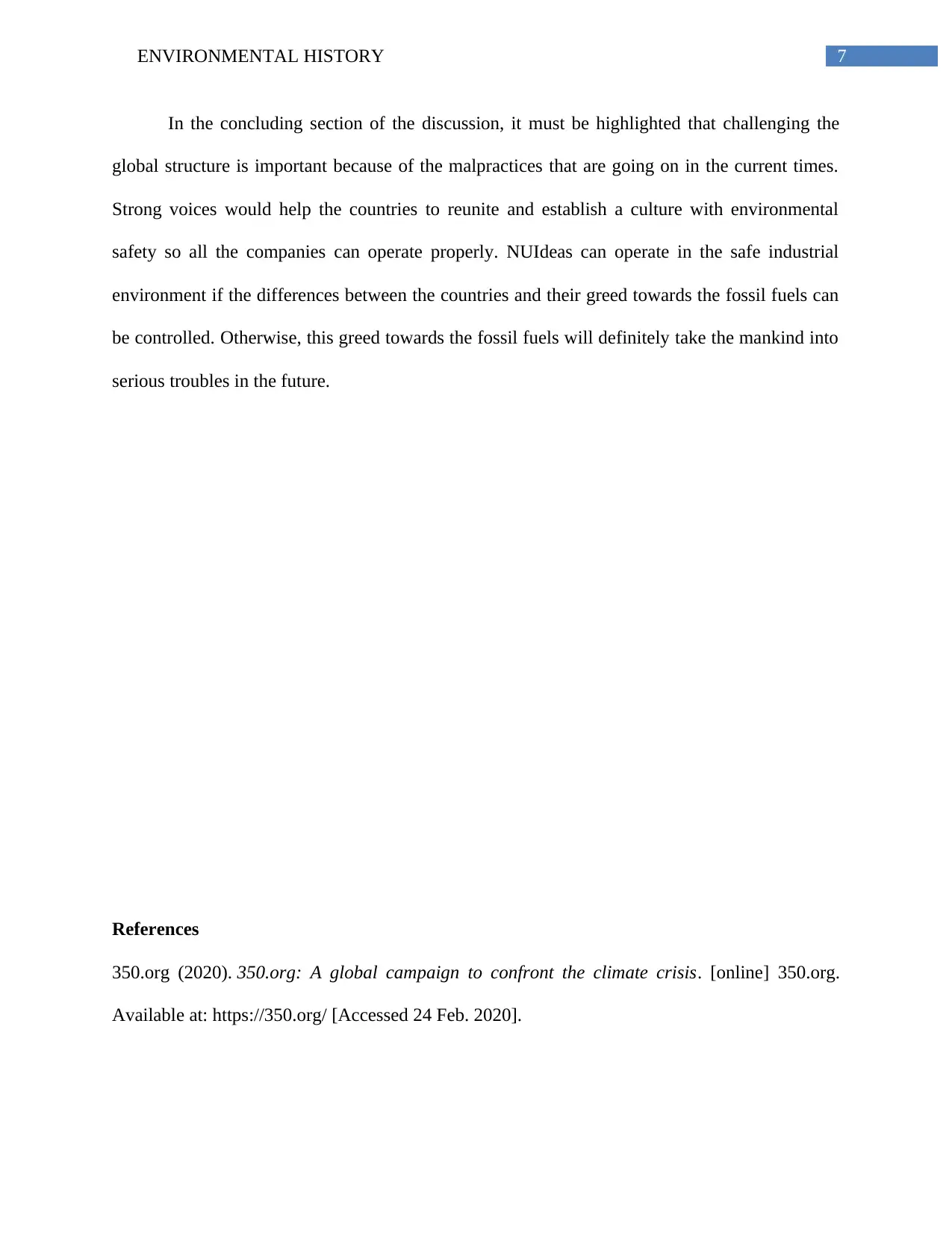
7ENVIRONMENTAL HISTORY
In the concluding section of the discussion, it must be highlighted that challenging the
global structure is important because of the malpractices that are going on in the current times.
Strong voices would help the countries to reunite and establish a culture with environmental
safety so all the companies can operate properly. NUIdeas can operate in the safe industrial
environment if the differences between the countries and their greed towards the fossil fuels can
be controlled. Otherwise, this greed towards the fossil fuels will definitely take the mankind into
serious troubles in the future.
References
350.org (2020). 350.org: A global campaign to confront the climate crisis. [online] 350.org.
Available at: https://350.org/ [Accessed 24 Feb. 2020].
In the concluding section of the discussion, it must be highlighted that challenging the
global structure is important because of the malpractices that are going on in the current times.
Strong voices would help the countries to reunite and establish a culture with environmental
safety so all the companies can operate properly. NUIdeas can operate in the safe industrial
environment if the differences between the countries and their greed towards the fossil fuels can
be controlled. Otherwise, this greed towards the fossil fuels will definitely take the mankind into
serious troubles in the future.
References
350.org (2020). 350.org: A global campaign to confront the climate crisis. [online] 350.org.
Available at: https://350.org/ [Accessed 24 Feb. 2020].
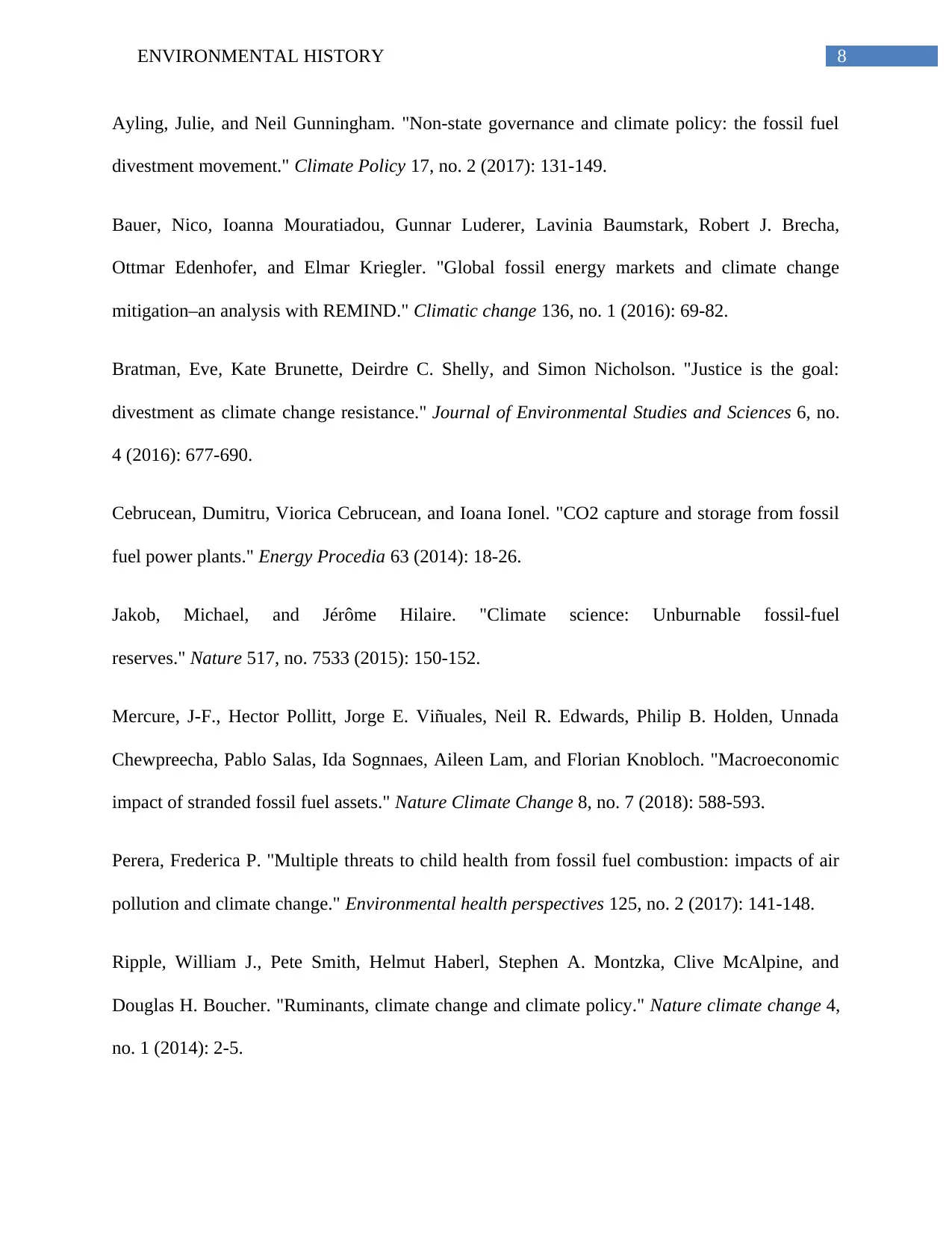
8ENVIRONMENTAL HISTORY
Ayling, Julie, and Neil Gunningham. "Non-state governance and climate policy: the fossil fuel
divestment movement." Climate Policy 17, no. 2 (2017): 131-149.
Bauer, Nico, Ioanna Mouratiadou, Gunnar Luderer, Lavinia Baumstark, Robert J. Brecha,
Ottmar Edenhofer, and Elmar Kriegler. "Global fossil energy markets and climate change
mitigation–an analysis with REMIND." Climatic change 136, no. 1 (2016): 69-82.
Bratman, Eve, Kate Brunette, Deirdre C. Shelly, and Simon Nicholson. "Justice is the goal:
divestment as climate change resistance." Journal of Environmental Studies and Sciences 6, no.
4 (2016): 677-690.
Cebrucean, Dumitru, Viorica Cebrucean, and Ioana Ionel. "CO2 capture and storage from fossil
fuel power plants." Energy Procedia 63 (2014): 18-26.
Jakob, Michael, and Jérôme Hilaire. "Climate science: Unburnable fossil-fuel
reserves." Nature 517, no. 7533 (2015): 150-152.
Mercure, J-F., Hector Pollitt, Jorge E. Viñuales, Neil R. Edwards, Philip B. Holden, Unnada
Chewpreecha, Pablo Salas, Ida Sognnaes, Aileen Lam, and Florian Knobloch. "Macroeconomic
impact of stranded fossil fuel assets." Nature Climate Change 8, no. 7 (2018): 588-593.
Perera, Frederica P. "Multiple threats to child health from fossil fuel combustion: impacts of air
pollution and climate change." Environmental health perspectives 125, no. 2 (2017): 141-148.
Ripple, William J., Pete Smith, Helmut Haberl, Stephen A. Montzka, Clive McAlpine, and
Douglas H. Boucher. "Ruminants, climate change and climate policy." Nature climate change 4,
no. 1 (2014): 2-5.
Ayling, Julie, and Neil Gunningham. "Non-state governance and climate policy: the fossil fuel
divestment movement." Climate Policy 17, no. 2 (2017): 131-149.
Bauer, Nico, Ioanna Mouratiadou, Gunnar Luderer, Lavinia Baumstark, Robert J. Brecha,
Ottmar Edenhofer, and Elmar Kriegler. "Global fossil energy markets and climate change
mitigation–an analysis with REMIND." Climatic change 136, no. 1 (2016): 69-82.
Bratman, Eve, Kate Brunette, Deirdre C. Shelly, and Simon Nicholson. "Justice is the goal:
divestment as climate change resistance." Journal of Environmental Studies and Sciences 6, no.
4 (2016): 677-690.
Cebrucean, Dumitru, Viorica Cebrucean, and Ioana Ionel. "CO2 capture and storage from fossil
fuel power plants." Energy Procedia 63 (2014): 18-26.
Jakob, Michael, and Jérôme Hilaire. "Climate science: Unburnable fossil-fuel
reserves." Nature 517, no. 7533 (2015): 150-152.
Mercure, J-F., Hector Pollitt, Jorge E. Viñuales, Neil R. Edwards, Philip B. Holden, Unnada
Chewpreecha, Pablo Salas, Ida Sognnaes, Aileen Lam, and Florian Knobloch. "Macroeconomic
impact of stranded fossil fuel assets." Nature Climate Change 8, no. 7 (2018): 588-593.
Perera, Frederica P. "Multiple threats to child health from fossil fuel combustion: impacts of air
pollution and climate change." Environmental health perspectives 125, no. 2 (2017): 141-148.
Ripple, William J., Pete Smith, Helmut Haberl, Stephen A. Montzka, Clive McAlpine, and
Douglas H. Boucher. "Ruminants, climate change and climate policy." Nature climate change 4,
no. 1 (2014): 2-5.
⊘ This is a preview!⊘
Do you want full access?
Subscribe today to unlock all pages.

Trusted by 1+ million students worldwide
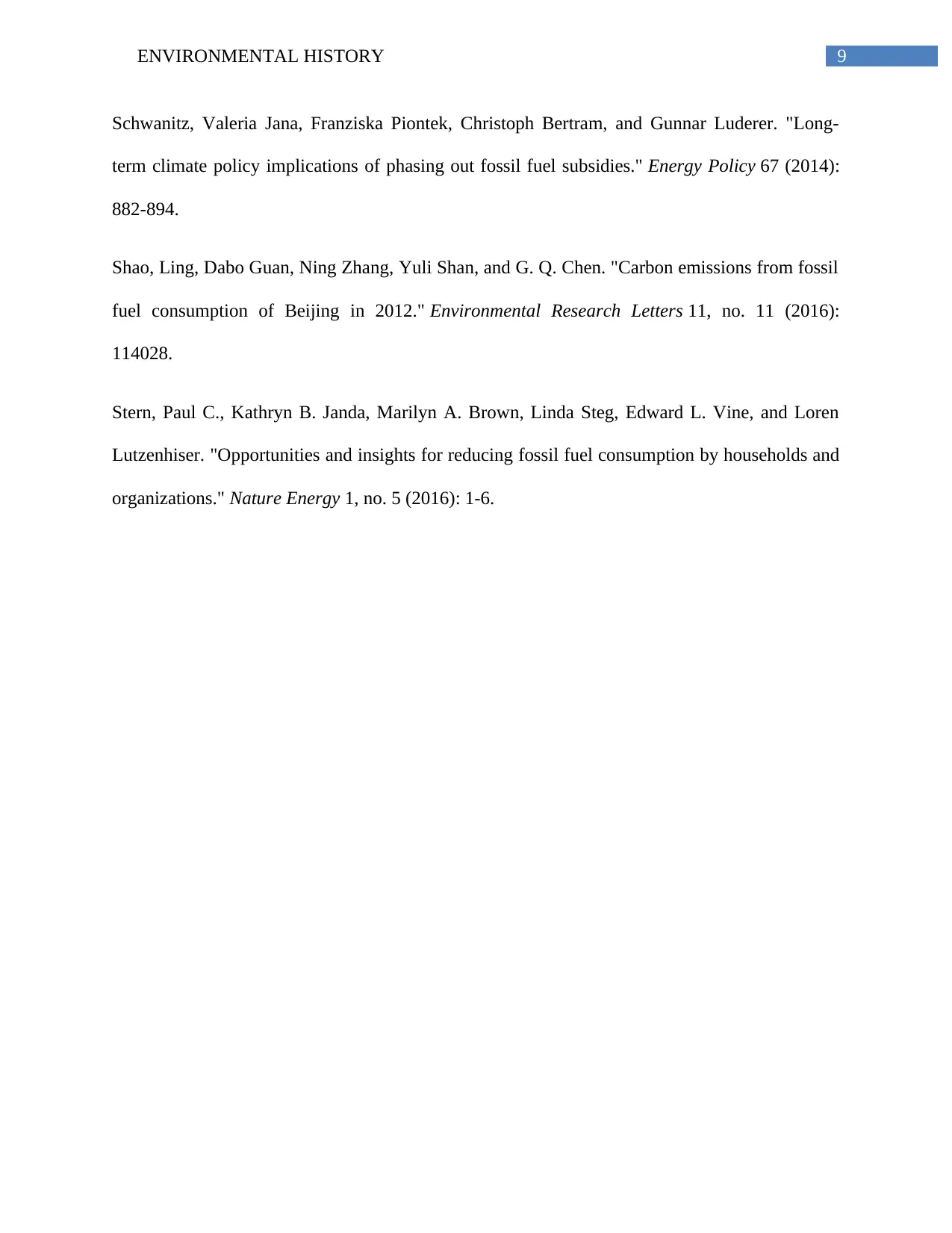
9ENVIRONMENTAL HISTORY
Schwanitz, Valeria Jana, Franziska Piontek, Christoph Bertram, and Gunnar Luderer. "Long-
term climate policy implications of phasing out fossil fuel subsidies." Energy Policy 67 (2014):
882-894.
Shao, Ling, Dabo Guan, Ning Zhang, Yuli Shan, and G. Q. Chen. "Carbon emissions from fossil
fuel consumption of Beijing in 2012." Environmental Research Letters 11, no. 11 (2016):
114028.
Stern, Paul C., Kathryn B. Janda, Marilyn A. Brown, Linda Steg, Edward L. Vine, and Loren
Lutzenhiser. "Opportunities and insights for reducing fossil fuel consumption by households and
organizations." Nature Energy 1, no. 5 (2016): 1-6.
Schwanitz, Valeria Jana, Franziska Piontek, Christoph Bertram, and Gunnar Luderer. "Long-
term climate policy implications of phasing out fossil fuel subsidies." Energy Policy 67 (2014):
882-894.
Shao, Ling, Dabo Guan, Ning Zhang, Yuli Shan, and G. Q. Chen. "Carbon emissions from fossil
fuel consumption of Beijing in 2012." Environmental Research Letters 11, no. 11 (2016):
114028.
Stern, Paul C., Kathryn B. Janda, Marilyn A. Brown, Linda Steg, Edward L. Vine, and Loren
Lutzenhiser. "Opportunities and insights for reducing fossil fuel consumption by households and
organizations." Nature Energy 1, no. 5 (2016): 1-6.
1 out of 10
Related Documents
Your All-in-One AI-Powered Toolkit for Academic Success.
+13062052269
info@desklib.com
Available 24*7 on WhatsApp / Email
![[object Object]](/_next/static/media/star-bottom.7253800d.svg)
Unlock your academic potential
© 2024 | Zucol Services PVT LTD | All rights reserved.





